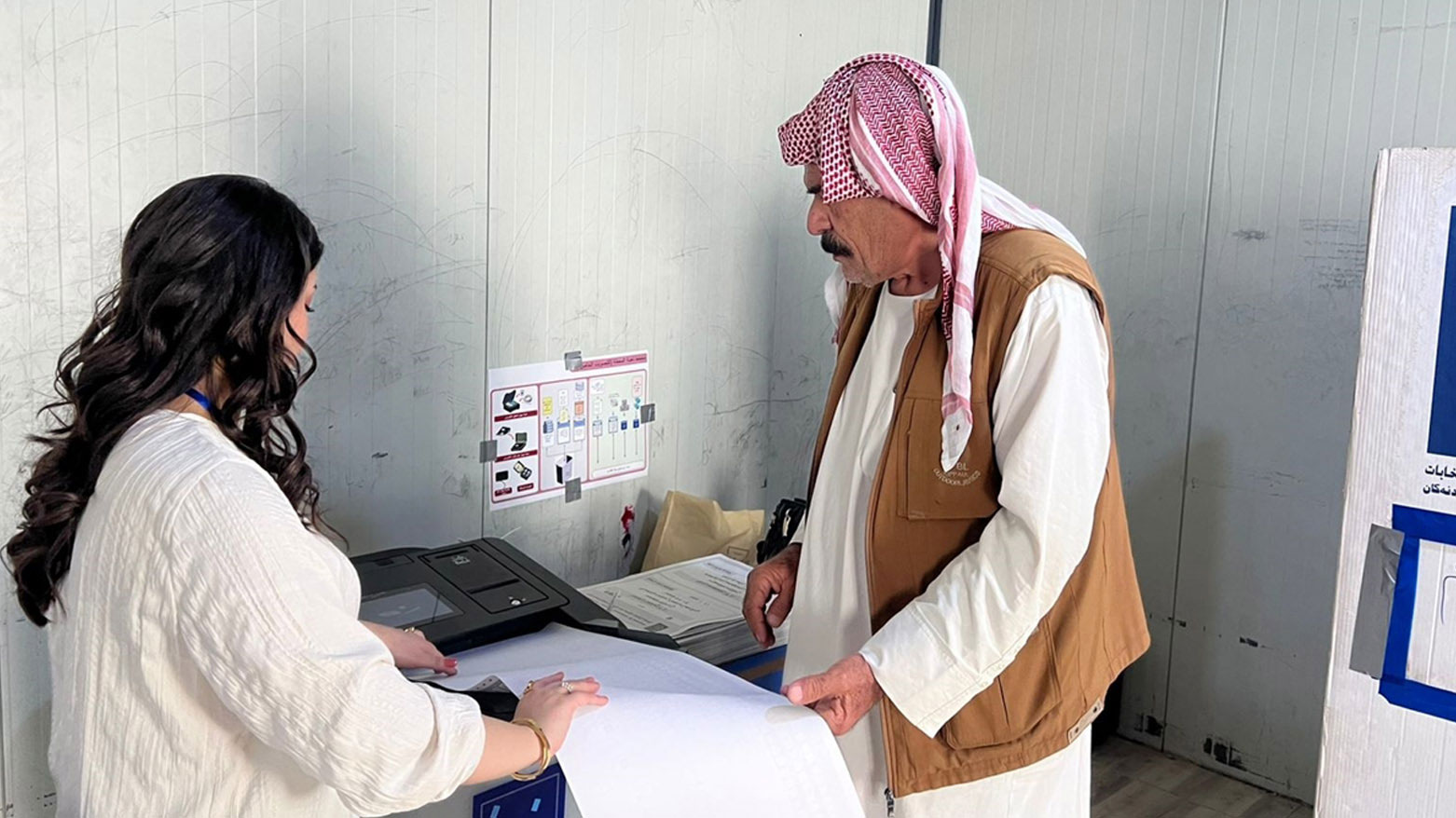'Those Who Have Fingerprint Problems Can Participate and Vote,' Says IHEC' Duhok Branch
Duhok's special vote proceeds smoothly with a high 50% security personnel turnout so far, but a low 10% displaced vote. Officials confirm technical issues have been solved.

ERBIL (Kurdistan24) – In a crucial special election day marked by a dramatic contrast in voter participation, security forces in Duhok province turned out in force with a 50% participation rate by mid-morning, while the turnout among the province's large displaced population languished at a mere 10%.
Despite this disparity, officials from the Independent High Electoral Commission of Iraq (IHEC) hailed the day as a major operational success, confirming that early technical glitches were swiftly resolved and, in a significant reassurance to voters, that robust backup systems were in place to ensure that even those with fingerprint verification problems could cast their ballots.
The first phase of Iraq's sixth parliamentary elections on Sunday saw over 1.3 million security personnel and more than 26,000 internally displaced persons (IDPs) head to the polls across the country. In Duhok province, which hosts the majority of Iraq's displaced population, the day was a tale of two different electoral experiences.
Khalid Abbas, the head of the Duhok branch of IHEC, provided a detailed overview of the situation in a press conference on Sunday, painting a picture of a technically sound process but one with a significant enthusiasm gap between different voter groups.
"This morning we had some technical problems, such as machines stopping, but they have all been resolved, and now the voting process is proceeding well," Abbas stated, addressing the primary concern that has plagued past Iraqi elections.
His announcement that the initial issues were quickly fixed underscored a new level of preparedness and responsiveness from the commission.
He confirmed the high participation rate among the security forces, noting that by 11 AM, turnout was at a robust 50%. However, he expressed concern about the low participation among the displaced. "So far, the turnout of the displaced is very low, which was 10% until 11 AM," he said, adding, "but we expect the rate to increase" as the day progresses.
Duhok's electoral operation is a massive undertaking. Abbas detailed the scale, explaining that for the special voting of the security forces, the province had established 195 polling stations within 43 centers, catering to 56,000 eligible voters.
For the displaced population, a network of 23 centers and 73 polling stations was set up, both inside and outside the IDP camps, to serve the nearly 26,000 registered voters.
In what was perhaps his most significant and reassuring announcement, Abbas addressed the persistent issue of biometric verification failures, which have disenfranchised voters in previous elections. He revealed that the commission had deployed a comprehensive contingency plan to prevent a repeat of these problems.
"We have sent 150 backup voting machines for all the centers in Duhok province and the independent administration of Zakho," he said. He then delivered a clear and unequivocal message to the public: "The other 150 have not been used much so far, meaning if those voters came and had fingerprint problems, they can participate and vote."
This declaration that a solution was readily available was a crucial confidence-building measure, promising that technicalities would not stand in the way of the people's right to vote.
The smooth process in Duhok was mirrored in its sub-districts. In the Qasrok sub-district, part of Shekhan, the head of the local IHEC branch, Shamal Mazmir, told Kurdistan24 exclusively that the process there was proceeding without any issues. "The process is proceeding very well and there have been no technical problems," Mazmir confirmed, noting that in the Shekhan camp, over 800 people were eligible to vote across three fully operational polling stations. "We will be here until the end of the process. We are closely monitoring the situation, and any problem or issue will be resolved as soon as possible," he affirmed.
Mazmir also provided a critical clarification on the specific voting rules for the displaced people of Shingal (Sinjar), a community that has suffered immense trauma and displacement. He explained that a special "facilitation" had been put in place to ensure their votes were not lost.
"Those for whom registration and recording have been done in the camps can vote inside the camps and cannot return to Shingal," he said. "Those for whom the registration and recording process has been done outside the camps will vote in their places." This tailored approach, he explained, was designed "so that they can participate in the election process according to their place of residence and their votes are not wasted."
As the day progressed towards the 6:00 PM close of polls, the procedures for securing the vote were clear. Khalid Abbas in Duhok explained the next steps: "It will continue until 6:00 PM and then the reports and results will be announced quickly and the results will be sent to Baghdad. Then, in all polling stations, the manual counting process will begin and the votes will be counted."
This dual process of immediate electronic transmission followed by a manual recount is designed to ensure both speed and accuracy, further bolstering the integrity of the election.
The special voting day in Duhok and across Iraq is the essential prelude to the general election on Tuesday, November 11. It is the first phase of a monumental democratic exercise with 7,744 candidates competing for seats in the national parliament, after an initial 848 were excluded from the race.
The successful and largely problem-free execution of the special vote, especially the commission's proactive solutions to long-standing technical problems, has set a positive and secure precedent for the wider election to come, even as the challenge of mobilizing the nation's most vulnerable voters remains a critical task for the days ahead.